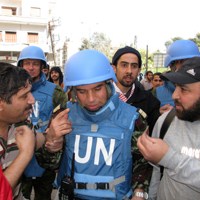Since the conflict in South Sudan escalated in December, well-meaning governments and United Nations officials have repeatedly argued that only a political solution can end the fighting. “There is no military solution,” U.S. Ambassador to the U.N. Samantha Power told CNN on Christmas Eve. But the South Sudanese government does not seem entirely convinced. Over the past week it has ratcheted up its offensives against rebel-held areas, recapturing the economically important town of Bentiu. Bor, another major center in rebel hands, has also been under attack. The government is still in peace talks with rebel envoys, but it is evidently intent on negotiating from the strongest possible military position.
South Sudanese President Salva Kiir has been bolstered by air support and troops from Uganda, as well as political signals of support from his old enemies in Sudan. If Kiir needs further encouragement, he needs only to think of other governments that have been told to find a “political solution” to internal conflicts. From Sri Lanka to Darfur and Syria, leaders who have ignored this advice have managed to fight on in the face of international revulsion. Western powers and the U.N. appear willing—or obliged—to put aside bargaining with these leaders, tragically affirming the continued political value of brute force.
“Only a political settlement can end the intense suffering in Syria,” British Foreign Minister William Hague declared via Twitter this weekend. Yet President Bashar al-Assad and his army have fought long enough and viciously enough to ensure that they approach upcoming peace talks in Switzerland with far more leverage than their panoply of divided opponents. This hardly means that Assad has won an outright victory. He has done irreparable damage to Syria’s social and political cohesion, just as Kiir and his foes could wreck South Sudan’s future if they continue to fight. Western governments still insist that Assad cannot be part of a postwar government. But his use of force has meant that Assad and his clique remain decisive.

